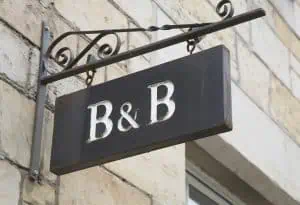Amsterdam has experienced explosive growth in the number of bed & breakfasts ( B & Bs ) in recent years . Because so many B & Bs have been added, the municipality of Amsterdam has decided to tighten the rules for B & Bs in 2020. In this blog we look at these proposed rule changes for B & Bs .
The changes listed below are not yet definitive. Nevertheless, it is very likely that most of these regulatory changes will be introduced from 1 January 2020. These rules are an addition to the existing rules. The existing rules can be found here . We list the most important changes from 1 January 2020 for you, followed by an explanation.
From now on a B&B requires a permit;
A maximum number of B & Bs will be determined per neighborhood ;
Only owners (ie no tenants) can operate a B&B from January 1, 2020 ( this change has been canceled. Tenants may also be eligible for a permit );
B&B holder must keep night stay during guest stay;
The B&B may never be offered for holiday rental;
A maximum of 61 m2 may be rented to guests (despite the size of the home);
Explanation changes
A permit is now required for a B&B
Explanation : One of the most important changes is that a permit is now required for a B&B. Until now it has only been a duty to report. The permit requirement gives the municipality two important instruments for enforcing the rules. For example, when applying for a permit, it can assess whether the B&B meets the conditions and it also has the option of withdrawing a permit in the event of a violation.
A maximum number of B & Bs will be determined per neighborhood
Explanation: Quotas are set for each neighborhood. If the number of applications is higher than the neighborhood quota, the permits will be issued by drawing lots. The permit is in principle issued for a period of five years. This also means that a permit holder in a popular neighborhood runs the risk of losing his permit after five years.
Only owners (ie no tenants) can operate a B&B from January 1, 2020 ( this change has been canceled )
Explanation: Until now it was the case that tenants could also operate a B&B in their rented property. This is no longer permitted from 2020 and tenants will therefore not be eligible for a permit. The objective of the municipality for this measure is to prevent so-called ‘straw structures’. In some cases, landlords had thought that they could let a tenant run the B&B, who then had to transfer part of the income (or everything) to the landlord. The municipality’s main objection to this was that one lessor could in fact operate several B & Bs . It is still unclear whether the operator of the B&B must be 100% owner or whether 50% (or less) is sufficient.
Transitional arrangement
The previous measure is of course a tough one for renting B&B holders. A small compensation for these B&B holders is that there will be a transitional arrangement for a period of two years. In short, these renting B&B holders only have to definitively stop their activities from January 2022. To be eligible for this transitional arrangement, the B&B must have started before January 1, 2019. This means that a tenant who started a B&B in February 2019, for example, will have to discontinue his B&B from 1 January 2020.
This transitional arrangement also applies to owners who are raffled for a permit. If an owner started a B&B before January 1, 2019, this owner will receive a two-year respite. In contrast to the tenant, the owner will be able to (again) compete for a new draw for a permit.
The B&B may never be offered for holiday rental
It becomes mandatory for the manager to keep his own night stay during the guests’ stay
Explanation: For many it is unclear what the difference is between holiday rental and B&B, not least because both are often offered via the same type of websites. In short, a holiday home is rented occasionally in the absence of the owner or tenant of the home. The original idea behind the term ‘holiday rental’ is that the owner or tenant himself is ‘on holiday’ during the period in which the property is rented. This is in contrast to the B&B, which basically rents all year round, whereby the B&B owner himself actively acts as host / hostess.
Because different rules apply to holiday rentals and B & B, the municipality of Amsterdam wanted to emphasize the distinction by stating that the owner of the B & B itself always stays in the home during the night. Furthermore, a B&B permit holder may never offer the relevant home for holiday rental. So if the B&B holder goes on holiday as a self-employed person, he may not offer the property for holiday rental.
A maximum of 61m2 may be rented to guests regardless of the size of the property ;
Explanation: Until now, B&B owners were allowed to make a maximum of 40% of their housing surface available to their guests. This rule is maintained, but also the additional rule that a maximum of 61 m2 may be rented out to guests regardless of the size of the home. This rule may have costly consequences for existing larger B & Bs now that this means that the property will have to be classified differently. For the time being, it is unclear whether the municipality is willing to take into account existing larger B & Bs .
Conclusion
The new regulations for B & Bs are quite drastic now that existing B&B holders may have to stop their B&B from January 1, 2022 or even January 1, 2020. This month (October 2019), the municipality will announce whether the draft plans are actually being implemented or whether adjustments are still being made. It will also become more clear about the exact method of granting permits. We will keep you informed of the latest developments regarding B&B regulations.
Do you own a B&B or do you want to start one, please feel free to contact M2Lawyers.
Lawyer Ginio Beij (beij@m2advocaten.nl)

